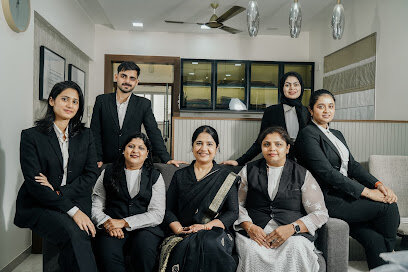Best Child Visitation Lawyers in Pune
Share your needs with us, get contacted by law firms.
Free. Takes 2 min.
Free Guide to Hiring a Family Lawyer
List of the best lawyers in Pune, India
About Child Visitation Law in Pune, India
Child visitation laws in Pune, India, are primarily governed by the Guardians and Wards Act of 1890 and the Hindu Minority and Guardianship Act of 1956. These laws aim to protect the welfare and best interests of the child while ensuring that both parents continue to maintain a relationship with their child post-separation or divorce. Visitation rights are typically granted by the court and include specified times and conditions under which the non-custodial parent can visit the child.
Why You May Need a Lawyer
There are several situations where you might require legal assistance regarding child visitation in Pune:
- Establishing Visitation Rights: If you are a non-custodial parent and wish to secure official visitation rights through a court order.
- Enforcing Visitation Rights: If the custodial parent is not adhering to the court-ordered visitation schedule.
- Modifying Visitation Agreements: If there is a need to change the terms of visitation due to changed circumstances such as relocation, job changes, or the child's needs.
- Resolving Disputes: When disputes arise between parents regarding the terms or implementation of visitation.
- Protecting Child's Welfare: If there are concerns about the child's safety or well-being during visitation.
Local Laws Overview
Key aspects of local laws relevant to Child Visitation in Pune include:
- The Guardians and Wards Act, 1890: Provides the legal framework for guardianship and custody, allowing the court to decide on visitation rights.
- The Hindu Minority and Guardianship Act, 1956: Applicable to Hindu families, it outlines the rights and obligations of guardians and the legal process for determining custody and visitation.
- Best Interest of the Child: The primary consideration for the court is always the best interest of the child, which may encompass emotional, physical, and educational well-being.
- Customary Laws: In some cases, customary laws and practices may influence the court's decisions, especially in regions with strong cultural traditions.
Frequently Asked Questions
What are child visitation rights?
Child visitation rights are legal permissions granted by the court to a non-custodial parent to visit and spend time with their child. These rights can include specified dates and conditions to ensure the child's well-being.
How can I secure visitation rights in Pune?
To secure visitation rights, you need to file a petition in the family court. The court will review your case, taking into account the best interest of the child, and then may grant a visitation order.
Can visitation rights be denied?
Yes, visitation rights may be denied or restricted if the court determines that such visits could harm the child's physical or emotional well-being.
How are visitation disputes resolved?
Visitation disputes can be resolved through mediation, negotiation between parents, or by seeking a court intervention where a judge will make a decision based on the child's best interest.
What happens if the custodial parent refuses visitation?
If the custodial parent refuses visitation, the non-custodial parent can file a contempt petition in the court to enforce the visitation order.
Can visitation rights be modified?
Yes, visitation rights can be modified by filing an application in the court, usually due to changes in circumstances like relocation, changes in the child's needs, or schedule conflicts.
Are there different types of visitation orders?
Yes, common types include supervised visitation, unsupervised visitation, virtual visitation, and scheduled visitation. The type of visitation order depends on the specific circumstances and needs of the child and parents.
Do grandparents have visitation rights?
In certain cases, grandparents may seek visitation rights, especially if they have a significant pre-existing relationship with the child. They can petition the court for these rights.
What if I can't afford a lawyer?
If you cannot afford a lawyer, there are legal aid services and non-profit organizations in Pune that offer free or subsidized legal assistance to those in need.
How long does it take to resolve a visitation case?
The duration of resolving a visitation case can vary widely depending on the complexity of the case, the court's schedule, and the level of cooperation between involved parties. It can take anywhere from a few months to over a year.
Additional Resources
Here are some resources that can be helpful if you need legal advice on child visitation:
- Family Courts in Pune: The family courts are the primary judicial bodies handling child visitation cases.
- Maharashtra State Legal Services Authority: Provides legal aid services to individuals who cannot afford legal representation.
- Non-Governmental Organizations (NGOs): Organizations like Child Rights and You (CRY) and Save the Children offer support and resources related to child welfare and legal advice.
- Pune Bar Association: Can help connect you with experienced family law attorneys in Pune.
Next Steps
If you need legal assistance with child visitation, here are the steps you can take:
- Consult with a qualified family law attorney in Pune to discuss your case and understand your rights.
- Gather necessary documents and evidence that support your case, such as school records, medical records, and any relevant communications.
- Consider mediation as a first step to resolve disputes amicably without going to court.
- File a petition in the family court if mediation doesn't work or if you're seeking a formal visitation order.
- Attend all court hearings and comply with any court orders or recommendations.
- Stay focused on the best interest of the child, ensuring that their needs and well-being are prioritized.
Lawzana helps you find the best lawyers and law firms in Pune through a curated and pre-screened list of qualified legal professionals. Our platform offers rankings and detailed profiles of attorneys and law firms, allowing you to compare based on practice areas, including Child Visitation, experience, and client feedback.
Each profile includes a description of the firm's areas of practice, client reviews, team members and partners, year of establishment, spoken languages, office locations, contact information, social media presence, and any published articles or resources. Most firms on our platform speak English and are experienced in both local and international legal matters.
Get a quote from top-rated law firms in Pune, India — quickly, securely, and without unnecessary hassle.
Disclaimer:
The information provided on this page is for general informational purposes only and does not constitute legal advice. While we strive to ensure the accuracy and relevance of the content, legal information may change over time, and interpretations of the law can vary. You should always consult with a qualified legal professional for advice specific to your situation.
We disclaim all liability for actions taken or not taken based on the content of this page. If you believe any information is incorrect or outdated, please contact us, and we will review and update it where appropriate.















